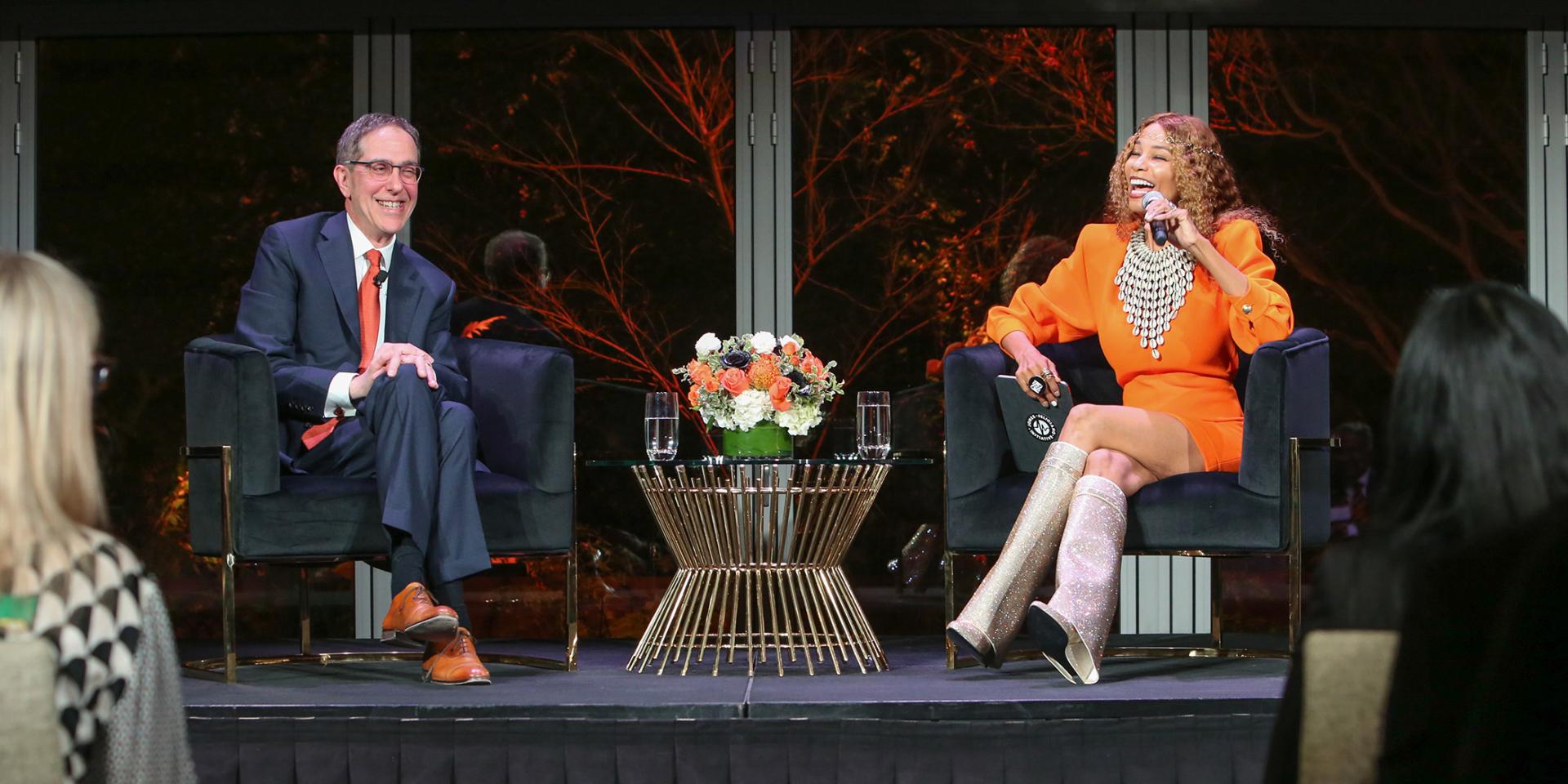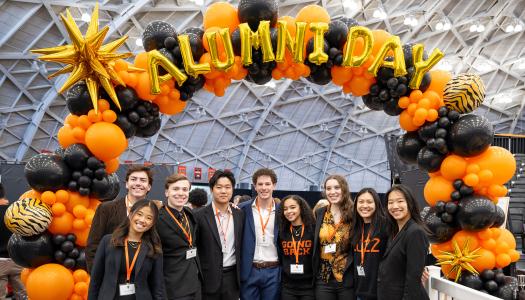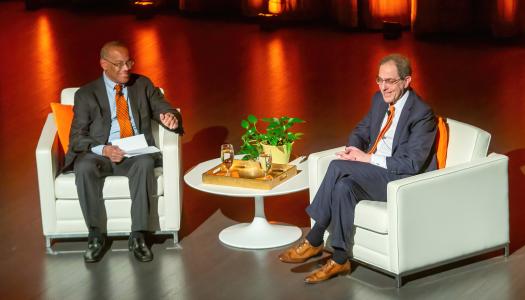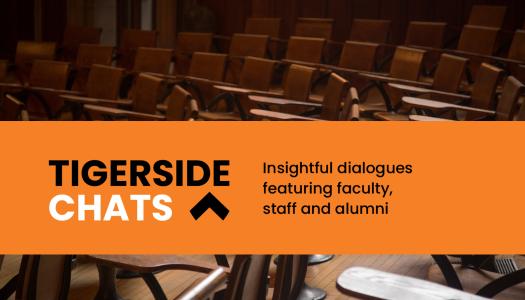Photo by Jenny Stein
President Christopher L. Eisgruber ’83 joined approximately 450 Princeton alumni and friends in Los Angeles on Jan. 10 to discuss the current state of higher education in the U.S. and provide updates on the University’s strategic initiatives during the third year of the public phase of the Venture Forward campaign.
Eisgruber’s conversation at the Skirball Cultural Center with Kwanza Jones ’93, co-founder and CEO of the Kwanza Jones & José E. Feliciano Initiative, was preceded by a reception for graduate alumni and a general reception for all alumni, and was followed by a post-event reception and a gathering for Princeton’s affinity groups.
Alumni Council President Monica Moore Thompson ’89 welcomed alumni and introduced the Venture Forward campaign video featuring men’s basketball coach Mitch Henderson ’98 and professors Autumn Womack and Andrew Houck ’00. “The Venture Forward campaign highlights alumni engagement as one of its strategic pillars, shining a bright light on the many ways alumni come together as unique individuals to learn, to volunteer and to reunite, like at this evening’s event,” she said, before introducing Eisgruber and Jones.
Jones, a highly acclaimed musical artist and sought-after motivational speaker, set a dynamic tone for the evening’s conversation, saying “I’m bringing the energy tonight, Chris.” She then quickly rallied the audience to welcome Eisgruber with a traditional Princeton locomotive cheer, which set the tone for an energetic conversation that touched upon his perspectives on his job as president, the University’s commitment to attracting talent from all backgrounds, how Princeton can support all its students, championing free speech and the University’s new collaborative hub for artificial intelligence (AI).
Jones began by asking Eisgruber if, when he was a student, he had ever envisioned being a University president. “And why are you still doing it,” she said, “especially with so many unexpected things that I can imagine you’ve had to go through, from Supreme Court rulings and hearings, to protected and free speech, to the backlash against elite institutions.”
Becoming president of Princeton University was not something he’d ever imagined early in his career, said Eisgruber, who received his Princeton degree in physics and earned his law degree at the University of Chicago. But after he joined the faculty at Princeton and then served as its provost for nine years, he was drawn to the role. “Part of that decision was how I felt about Princeton and how it had mattered to me; part of it was about a feeling that education, like what Princeton delivers, was something that was a genuine good in a world where those goods are hard to find,” Eisgruber said. “And I thought, ‘If this university gives me the chance, I also want to make it possible to open up Princeton to more students from more backgrounds, to expand the student body, to increase our socioeconomic diversity.’”
A significant milestone in that effort and the Venture Forward campaign took place last spring, with the dedication of two new residential colleges — Yeh College and New College West — and their new dormitories, including two named for Jones and her spouse, José E. Feliciano ’94. “All of us have our own Princeton story,” Jones said, mentioning the names of some of the other new dormitories. “All of us do. How do we take it from being a Princeton that is my Princeton to a Princeton that is our Princeton?”
“Part of that ability to thrive on the campus is to be able to feel at home, to feel that the campus is your place and that you can take ownership of it,” Eisgruber said. “Some of that is in the iconography of the campus, in terms of enabling people to recognize themselves. It’s telling stories that haven’t been told before. It’s putting Toni Morrison’s name on what used to be called West College. It’s christening the Ikeda Archway for Kentaro Ikeda, who was one of our two Asian students who were on campus during World War II and who was confined by order of the United States government. Part of what we have to do is to recognize all of those backgrounds, and we have to find ways to make sure that people can communicate constructively, respect one another and learn from one another. That’s what creates the strength in our institution.”
Eisgruber pointed to the University’s gains in tripling the number of Pell Grant eligible students in the last 15 years, strengthening the transfer program that focuses on military veterans and community college students, and bolstering financial aid resources for graduate students. “There was lots of evidence that there were extraordinarily talented people who we were missing,” Eisgruber said. “We also know we’re never going to diversify the faculties of America’s universities if we don’t diversify the graduate schools.”
Jones asked Eisgruber about “small things that can make a big difference” in how alumni can help Princeton continue to venture forward. “I want you to be an ambassador for Princeton and for higher education more broadly,” he said. “One of the joys of my job is being able to ask people, ‘How did Princeton matter in your life?’ And people talk to me about the transformative experiences that they had as students. We have to tell that story right now to other people, because there are [negative] stories being told about what’s happening in higher education. So it’s important to talk about why education matters. It’s important to talk about the strengths of universities. It’s important to talk about how it is that we make a difference in the world.”
During the Q&A session, one alumnus asked about the recent congressional hearings regarding antisemitism on college campuses, which led to the resignations of two Ivy League presidents. Eisgruber noted that it was a “tense semester because people have very different views about these issues in the Middle East, and they feel them with passion.”
“It’s important to be clear about standing against hate, about standing against antisemitism, about standing against Islamophobia,” he added. “And we have to be able to stand for free speech. We have to be able to stand for constructive discussion about difficult topics.”
He highlighted the November conversation between Amaney Jamal, the daughter of Palestinian immigrants who is now dean of Princeton’s School of Public and International Affairs, and Keren Yarhi-Milo, the Israeli-American former Princeton professor who is now dean of Columbia University’s School of International and Public Affairs, as an example of the importance of constructive and respectful dialogue. “We have to be clear about describing what it is we stand for and what it is we care about, and then we have to exemplify those values,” Eisgruber said. “I think we should be very proud of those conversations because there are not many places in society where people of such differing views are coming together to have those conversations.”
When a member of the audience asked about Princeton’s efforts in the field of AI, Eisgruber explained the University’s new joint initiative with the State of New Jersey that will build an “ecosystem around us.” Computer science is already the University’s largest major, led by an accomplished faculty. “We’re going to build on this the Princeton way, and that means we’re going to do it with first-class teaching and research,” he said. “We’re going to involve undergraduates and graduate students in all aspects of the operation, because that’s part of what makes Princeton excel.”
Following the Q&A session and a standing ovation for Eisgruber and Jones from the audience, Richard Estes ’86 capped the event by leading the audience in singing “Old Nassau.”
Graduate alumni reception
At the graduate alumni reception before the conversation with Eisgruber, Karthick Ramakrishnan *02, president of the Association of Princeton Graduate Alumni, welcomed Rodney D. Priestley, dean of the Graduate School and the Pomeroy and Betty Perry Smith Professor of Chemical and Biological Engineering, who provided updates on notable growth at the Graduate School.
“It is our belief that there is a direct relationship between strong support for students and their capacity as scholars to learn and break new ground in research and discovery,” said Priestley, after highlighting new doctoral programs in bioengineering, biophysics, and quantum science and engineering, and new graduate certificates in neuroscience and digital humanities. “That’s why we fully fund every Ph.D. student and offer one of the highest stipend rates in the nation, if not the highest. We also continue to grow as a residential graduate school. In just a few weeks, new graduate housing will open in the Meadows Neighborhood.”
Affinity groups reception
In the final event of the evening, approximately 200 alumni gathered to learn more about Princeton alumni affinity groups. Doug Chin ’83, vice president of the Princeton Club of Southern California, urged alumni to get involved. “Princeton’s affinity groups, born out of shared experiences and common backgrounds, play a vital role in fostering a sense of belonging and support within our community,” he said. “It’s through understanding and appreciating each other's unique stories and backgrounds that we truly enhance the Princeton experience.”
The Los Angeles event was the second of a quartet of 2023-24 presidential conversations scheduled before Alumni Day. Eisgruber will also visit West Palm Beach, Florida (Feb. 12) and Naples, Florida (Feb. 14) as part of the Venture Forward campaign.



